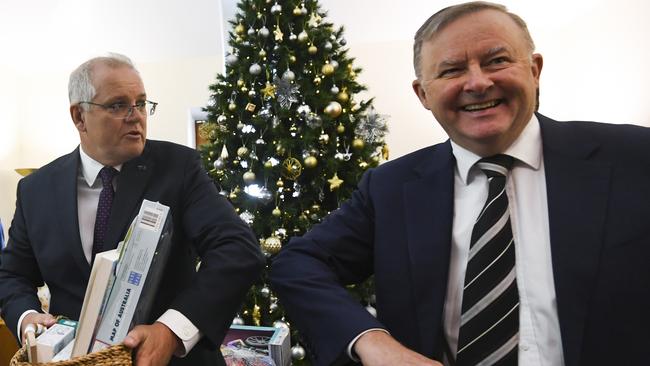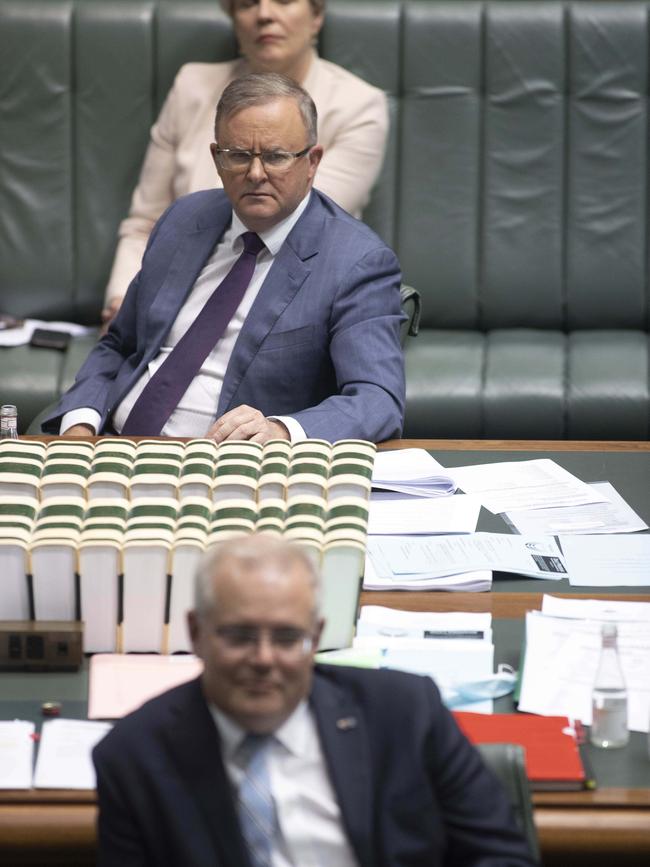2021 could be even tougher for Scott Morrison and Anthony Albanese
The possibility of an election could make 2021 even more challenging than 2020 for Scott Morrison and Anthony Albanese, writes Tom Minear

Opinion
Don't miss out on the headlines from Opinion. Followed categories will be added to My News.
Like the rest of us, our politicians are itching to see the back of this year.
But the vibe in Canberra is that 2021 will be even more challenging for Scott Morrison and Anthony Albanese.
An underrated factor in Australia’s coronavirus response is there was no chance of a federal election in 2020. It simplified the PM’s approach: good policy was good politics.
From August 7, Morrison can send us to the polls. And while he has vowed to see out a full term, that commitment is only valid until the day it’s not.
Senior government figures seem set on a 2022 election, but it hasn’t stopped MPs on both sides preparing for an early poll, an expectation which brings new problems for their leaders.
Morrison must navigate sustaining the surge of confidence that has come from Australia reaching COVID-normal, while also supporting those for whom next year will be just as hard — if not worse.
About 1.3 million people are unemployed and the government is cutting JobSeeker. At the end of March, JobKeeper switches off, leaving industries including aviation and tourism dangerously exposed.

And while an effective vaccine will be a shot in the government’s arm, it will not be an overnight success, and it will not repair the underlying economic damage.
Perversely, succeeding in the height of the crisis was easier for Morrison, because Australians wanted him to. As the pandemic subsides, he faces other challenges.
China is to blame for the breakdown in its relationship with Australia but Morrison — and the country — can’t afford a messy break-up.
Negotiating allegations of war crimes against Australian soldiers is a political minefield.
And by the end of next year, Morrison will have to decide Australia’s long-term climate change plan for the Glasgow summit.
This week, the government also waded into industrial relations in the most meaningful way since the disaster of WorkChoices, which was immediately invoked by Labor and unions to condemn the suspension of the “Better Off Overall Test” for COVID-hit firms.
Morrison will have to tie himself in knots to argue for this change for struggling businesses — in the face of a union campaign warning it will cause pay cuts — while also telling the country the comeback is on. If he can’t, expect the reform to be jettisoned.
In 2021, Labor’s narrative will focus on those left behind in the recovery. It means Morrison’s ultimate challenge is all about delivery.
“Otherwise, ‘Scotty from Marketing’ will stick,” one minister warned.
In an end-of-year homily to colleagues, Morrison preached stability, unity and humility.
“It’s never about us. It’s always about those we have come here to serve,” he said.
That’s the formula needed to govern in times like these. While Albanese takes the same view, he finishes the year knowing many colleagues are distracted. It is hard to have a conversation with a Labor MP that does not canvass the future of his leadership.
Some are optimistic. Morrison’s majority is thin, Labor is neck and neck in national polls, the economic pain won’t disappear overnight and Albanese is an experienced campaigner.
Others are convinced he is finished. The only question is which of their colleagues would be the best replacement.
In their eyes, Albanese hasn’t resolved problematic policy debates, such as on climate and China, while his communication has been waffly, his numbers have slumped in the suburbs, and he isn’t resoundingly popular.
They think Morrison has his measure (and Morrison clearly thinks so too).
Some of this is fair, some of this isn’t. Albanese’s problem is that once the leadership debate starts, it’s hard to stop. Some MPs say summer will be make-or-break because their colleagues have time to take the temperature of their electorates.
If they don’t like what they hear, survival instincts will kick in to save their own seats, and with the possibility of an election as soon as August, they won’t have much time to act.
Working in Albanese’s favour is the lack of a clear favourite to replace him, as well as rules requiring rank-and-file members to vote on their leader, which pose a problem while the Victorian branch is disenfranchised.
Given this instability, Albanese’s forthcoming reshuffle is fraught with danger.
Ambitious backbenchers, frustrated they haven’t been given a chance, complain that Albanese’s shadow cabinet includes 11 ministers from Kevin Rudd‘s cabinet in 2013. By contrast, just three remain from Tony Abbott’s cabinet.
Albanese values his experienced team, but some have struggled to accept losing last year’s unlosable election, leading colleagues to question their work rate.
“Ministers in exile,” one MP dubbed them.
Of course, demoting these veterans — who still want to be ministers again — risks further destabilisation.
More broadly, the pandemic has delayed the party’s recovery from 2019. Their national conference, needed to resolve Labor’s big-picture plan, has been pushed back to March.
But if 2020 has taught us anything, it’s that the political playing field can flip in an instant.
A year ago, Labor types thought Morrison’s Hawaii holiday was the beginning of the end for him.
Instead, he became the leader Australia needed in a crisis no one predicted.
Events, dear boy, events. Who knows what will happen next.
Tom Minear is Herald Sun National Politics Editor
Originally published as 2021 could be even tougher for Scott Morrison and Anthony Albanese



